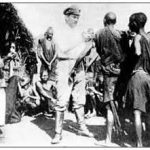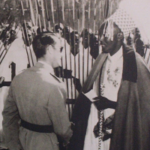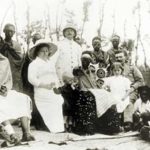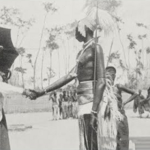Uburetwa
For Hutu, with or without cattle, the calculation of advantages and disadvantages of ubuhake clientship had to take account of ubureetwa, a relationship in which reciprocity was entirely absent. Whereas ubuhake symbolized special status in relation to the patron (however unequal the bargaining position of the partners became), ubureetwa symbolized low status. And while ubuhake clientship affected mainly (though not exclusively) those of Tuutsi status, ubureetwa service was (by colonial law) made incumbent on all Hutu men. But some managed to escape. Those constrained to do ubureetwa service were those whose lineage, or who individually, had not achieved favored status with the local chief or some other powerful person: Ubureetwa was a residual category for the powerless.
It is difficult to exaggerate the exploitative character of ubureetwa. The services performed were usually of the most menial kind-collecting and drying firewood for the use of the hill chief’s household, serving as night watchman, fetching water, cultivating the hill chief’s fields. Hutu were not only expected to perform such services without pay, but were often subjected to mistreatment as well. One of the most hated duties was that of nightwatchman (ukurarira). A missionary with many years experience in Rwanda described this in the following terms:
This is the one the Hutu complained about the most. In effect, they had to go in pairs, taking turns, to spend the night in the chief’s hut, standing guard. Each was required to bring a faggot of dry wood, which would be used to keep a fire going throughout the night. One wasn’t permitted to rest; blows would rain heavily on anyone caught sleeping.
Certain chiefs abused their authority and found ways to make this already odious duty even more irksome. It is recounted that several were so cruel they kept nightwatchmen outside the hut, exposed to the cold and the rain. Others, when morning came, would oblige the unhappy watchmen to go to the spring, often far away and at the bottom of the hill, to fetch water…. They also had to go and cut grass. Only after such harassment were they permitted to leave.
Among Hutu, a common term used for ubureetwa was ubunetsi, meaning “an obligatory corvée from which a person cannot escape and from which he receives no profit for himself. For ubureetwa directly affected the peasants’ relation to their principal economic resource: Noncompliance could provoke loss of one’s land. Of the various services performed for chiefs, ubureetwa was “the most hated and humiliating. It symbolized the servitude of the Hutu vis-à-vis the dominant minority.”
For many years the colonial administration resisted abolishing ubureetwa. This was the only “traditional obligation” which continued to enjoy legal status. Even when umuheto prestations and land (ubutaka) prestations had been replaced by money payments to the chiefs and subchiefs, ubureetwa was retained in its nonmonetary form. The rationale for this was in part political: “Considering that the principle of workdays owed by the Hutu to a notable was an expression of the
latter’s obedience, the Administration decided not to authorize a money payment in place of [this type] of corvée”.
Pressure from chiefs and subchiefs was undoubtedly important in this decision, and there were major economic reasons for this. In 1931 a program was inaugurated by the Administration to encourage (if not require) the cultivation of coffee for export. Chiefs and suhchiefs were to be the principal planters. The initial goal of the coffee program was 1000 coffee plants for each chief, 250 plants for each subchief, and 54 plants for each rural cultivator. As colonial policy encouraged the entry of political authorities into the money economy, their need for agricultural workers increased. Chiefs were also expected to plant trees to fight erosion; firewood from these woodlands produced additional income. Many chiefs also undertook cultivation of other marketable crops such as fruits and vegetables. The unpaid labor available through ubureetwa could thus contribute substantially to enrichment of the chiefs. Colonial policy provided both the labor and the market for chiefs to accumulate wealth.
R. Bourgeois, an idealistic young territorial officer who served as Territorial Administrator in Kinyaga (then called Kamembe Territory] in 1933-1935, noted, with chagrin, the exploitative behavior of Tuutsi chiefs:
A Hutu came to complain to me about how the subchief Rwanyabugigira is treating him: When he was busy maintaining his coffee field, a representative of the subchief came and requested that he go and work for the direct profit of . . . [the subchief]; he refused, only his wife went there [to work]. The Tutsi of the territory of Kamembe continue, it seems to me, to consider the Hutu as subject to corvée at their discretion [“corvéable à merci”]; it won’t be long before I discover that … [the chiefs also] view them as subject to tax at their discretion [“taillables à merci1].
Clearly, the introduction of coffee cultivation and other measures exacerbated the burdens on Hutu cultivators, who were expected to care for their own fields while the chiefs made increasing demands for labor. Often it was women who felt the brunt of these exactions. Bourgeois tried to restrict such practices, though with only limited success. His efforts were recognized by Hutu in Kinyaga who gave him the nickname “Rukiza” (shortened form of “Rukizaboro”-he who cures the poor).
Belgian policy and energetic administrators such as Bourgeois did attempt to regulate and “humanize” this system of labor requisition, but when a conflict arose between the human and administrative elements, the humanitarian elements were often ignored; the attempt to humanize an institution shaped largely by Belgium’s own policies was impossible without the transformation of the entire system.
The elevation of ubureetwa to the realm of colonial law meant that it affected more people and in a more burdensome fashion than in the past. Moreover, as the experience of Bourgeois indicates, regulations restricting ubureetwa were difficult to enforce; if Hutu peasants knew of the restrictions, they were often unable to benefit from them. Were a Hutu to go to court, he had to testify before Tuutsi judges against his own chief. The chief usually won, since he was accustomed to “dealing” with the European system and he often knew the judge. Even by daring to come before the court, the plaintiff risked certain retaliation on the part of the chiefs. With powers in the hands of the chiefs increasing and opportunities for legal redress curtailed, even Hutu ubuhake clients (abagaragu) found themselves compelled to perform manual labor for their patron in some areas of Rwanda after 1930.
The pattern of previous periods continued during the 1930s, whereby chiefs used measures of the colonial administration to their benefit. Recruitment of workers for akazi was used as a weapon; so was recruitment of people for other purposes, such as work for Europeans or for participation in a program of planned emigration. Beginning in the 1930s the Belgian administration in Rwanda sponsored a program to recruit Rwandan families for “transplantation” to Gishari, a sparsely populated highland area west of Goma in the Kivu Province of the Belgian Congo (now Zaïre). In Rwanda, the primary rationale advanced for the program was the need to reduce overpopulation. The major impetus behind it, however, was the fact that increased settlement in this sparsely populated region would assure labor and low cost food supplies to European settler enterprises in the vicinity of Gishari.
Consequently the administration mounted a vigorous campaign to persuade Rwandans to emigrate. In 1938, for example, the Resident of Rwanda instructed territorial administrators to make this project a major priority, warning them that the annual evaluation of their performance would be based in part on their success in finding people to emigrate. The Territorial Administrators were told that they should not neglect any opportunity to speak about this to Hutu natives and explain to them the advantages they would find upon settling in Gishari.
Decisions by Rwandans to relocate in Gishari were supposed to be made on a voluntary basis. But Kinyagan accounts suggest otherwise. For example, Karihanze, a resident of Rukunguri in Impara, associated
the loss of much of his lineage’s land with the Gishari program. According to Karihanze, his two brothers were forced to leave their homes when the local subchief appropriated their land to plant a eucalyptus grove (required by the administration) and obtain plots to distribute to his favorites. One brother fled to Zaïre; the other, whom the subchief planned to send to Gishari (“the place where chiefs sent people they didn’t like”) fled to a nearby subchiefdom where he became a land client of the subchief.
Cases such as this one speak eloquently for the need of protection, but the “protection” of clientship was, as we have seen, of an ambiguous kind. The dangers of not having a patron and the harshness of client status led many Kinyagans to seek escape through employment at European plantations or enterprises. Work for Europeans had begun earlier, but during the 1930s and 1940s there occurred a substantial increase in labor demands. In some respects, work for Europeans served as a functional substitute for clientship. Just as ubuhake clientship in the past had sometimes exempted the client from undesirable tasks, so contract labor offered a means of escaping ubureetwa or akazi services. Rather than fulfill the exactions of a subchief in order to ensure continued occupation of their land, many Kinyagans sought economic security through wage labor. Rather than relying on the precarious “protection,” which had become exploitation, of a patron-chief, many put themselves under the patronage of a European employer. The patron–client analogy cannot be extended too far, for a variety of arrangements evolved. Among workers within Kinyaga who did not leave their homes to work, some had ubuhake patrons while also holding a job. This could presumably have served as a means of “protection” of any cattle they might have had or been able to buy while working or of their land. Others, even those who bought cows with earnings from their work, tended not to become ubuhake clients. Some workers who contracted out to work but left their wives behind found that their wives were forced to keep up obligatory cultivation of crops and the provision of services to the subchief, and ta perform other duties reminiscent of ubureetwa. Although an “illegal” practice, this was difficult for the Administration to control.
https://uk.amateka.net/uburetwa/https://uk.amateka.net/wp-content/uploads/2020/08/blg3.jpghttps://uk.amateka.net/wp-content/uploads/2020/08/blg3-150x150.jpgChanges and ColonialismFor Hutu, with or without cattle, the calculation of advantages and disadvantages of ubuhake clientship had to take account of ubureetwa, a relationship in which reciprocity was entirely absent. Whereas ubuhake symbolized special status in relation to the patron (however unequal the bargaining position of the partners became), ubureetwa...BarataBarata rpierre@ikaze.netAdministratorAMATEKA | HISTORY OF RWANDA




